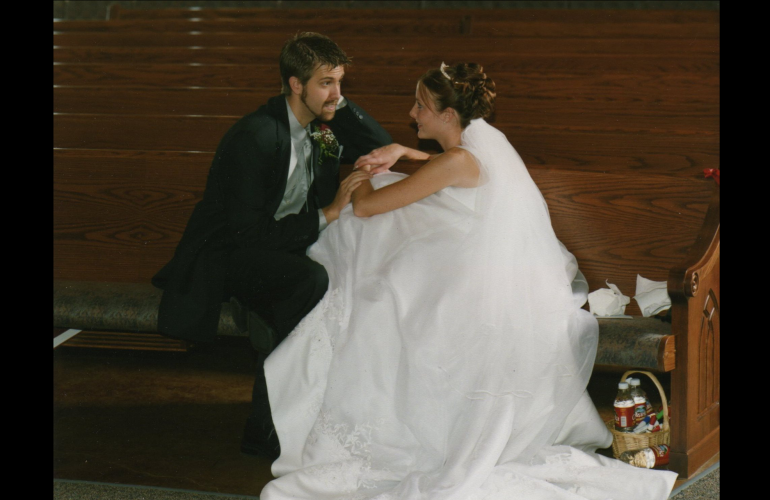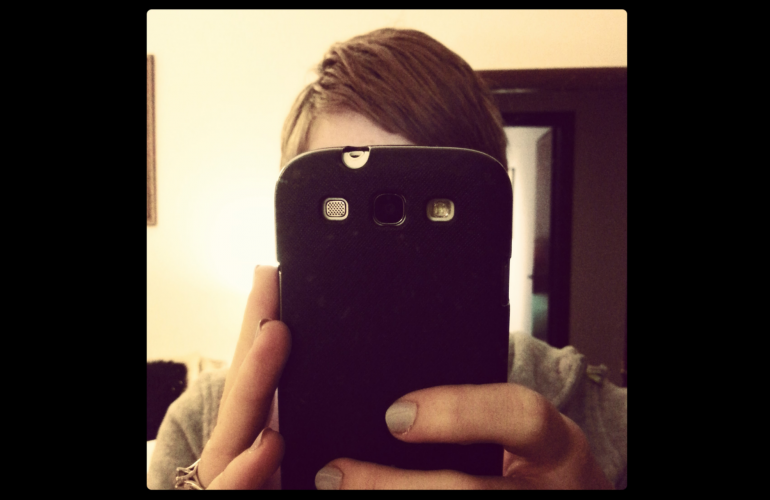For the second time in a week, I’d found myself smack dab between the lines of Mary Oliver’s “The Summer Day.” The first time had happened the day after we arrived in the Italian Alps, after we had laced up our shoes and left the narrow walls of our hotel and picnicked on a grassy slope, butterflies tangoing with the wind around us. The second time was on our final hike of our getaway. I was stretched out in a meadow with my camera, trying to soak in as much of the place as I could before we packed up, when the miniature grasshopper sprang onto a blade of grass in front of my nose. At least I think it’s a grasshopper. It could be a cricket or a locust or a boll weevil for all I know (or, to be honest, want to know) about six-legged creatures. I did not, however, jump back shrieking in my standard Insect Encounter Dance. Instead, I watched it, fascinated and at peace while Mary Oliver filled my mind:
“Who made the grasshopper?
This grasshopper, I mean-
the one who has flung herself out of the grass,
the one who is eating sugar out of my hand,
who is moving her jaws back and forth instead of up and down-
who is gazing around with her enormous and complicated eyes.”
I had the time to understand her phrase “idle and blessed,” to take the ancient Hebrew lyric “Be still and know” to heart. Out of all souvenirs, that state of unhurried intention is what I most wanted to bring home with me this summer.
It didn’t even make it down the mountainside.
///
August is a quiet month in Italy. School is a purely September construct; no one is thinking of fresh pencils or new jeans just yet. Instead, everyone is in beach mode, moving through the steamed air like half-dressed anemones. Shops are closed. Utility companies are on vacation. No one here expects anything remotely resembling productivity.
Except for me.
Even here, in the warm laze of summer, I choke for want of time. It feels almost like a nutritional deficiency, this sense of depletion when I look at the clock. If I could just work out how to double the hours between eating and sleeping, I think, then I could keep up with the pace of online work, to say nothing of the dust bunnies that procreate like… well, rabbits around here. I would also settle for getting my brain to work twice as quickly or my body to have twice the energy. Basically, my aspiration is to become Bart Simpson on Squishee syrup.
///
I just started reading Tsh Oxenreider’s Notes from a Blue Bike, and I can so closely relate to her struggle to keep the slower European lifestyle within the faster American context that I want to look up from every other sentence and tell her, “Me too!” I know I don’t have a great deal of room to pine over the European lifestyle considering that I live here and all. Obviously, I’m already in the perfect place for slowing down, embracing simplicity, and savoring the little things. What’s not as obvious, though, is that I’m still operating in an American context. I am the American context. My work philosophy, my personal expectations, my tendency to view life as an emergency… all of it is part of the cultural package that leaves me rushed and harried even when everyone around me is in vacation mode.
And this is after seven years of adapting.
Clearly, I still have much to learn from Italy, but Tsh’s assurance that we can choose how we live is buoying me today. Even as I write this, we’re packing up for a few days at the beach with friends. My attention keeps drifting down to the to-do list on my desk, a wee slip of paper that carries enough weight to sink me some days. It’s already tried twice today. There are so many chores to squeeze in before we leave, and I need to remember the beach stuff down in storage, and I haven’t gotten a haircut yet, and the girls will need packing help, and my email inbox is going to seed again, and how can I sit here dallying with words when there is so much to do, so very very much, and so very little time in which to do it, and AAAHHHHHHHH?
The answer is with that little grasshopper above. I can sit here and write today (albeit distractedly) for the same reason that I could lie on my stomach photographing blades of grass last month—because I chose to do it. I can ignore the chaotic context within me and do things on purpose that give me life. I can throw my lopsided sense of responsibility to the wind. I can choose.
I know that vacation isn’t the typical setting for one to channel her inner Thoreau, but my hope is that if I can remind myself how to live deliberately when I’m kicked back on the sand, maybe—just maybe—it will stick around once I’m back home.
“Doesn’t everything die at last, and too soon?
Tell me, what is it you plan to do
with your one wild and precious life?”









